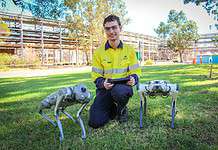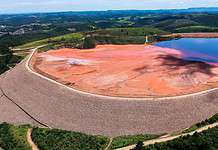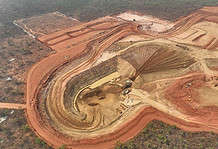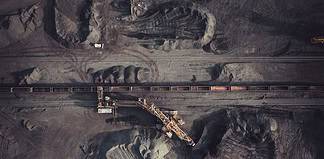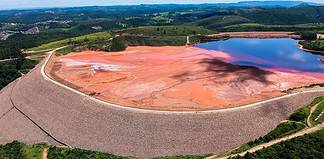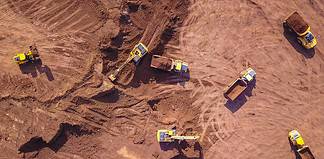SARAJI coking coal mine in Queensland’s coal-rich Bowen Basin coalfield is ready for the next stage in its development with its Saraji East expansion project.
Purchased by the BHP Mitsubishi Alliance joint venture, a 50:50 joint undertaking between Japanese trading house Mitsubishi and BHP, from Australian coal company New Hope Corporation in July 2008 for the price of $2.45b, the Saraji (East) coal project marked a new watershed price for coal mining assets in Australia.
New Hope went on to use the money received for its Saraji coal project to fund some coal asset acquisitions including stakes in former Rio Tinto’s Hunter Valley coal mine in NSW.
The Saraji project is an undeveloped metallurgical coal resources adjacent to BMA’s Saraji mine, 30km north of Dysart in Queensland’s Bowen Basin coal field.
The project was estimated to contain a coal resource of 690mt by New Hope.
Included in the purchase price for Saraji was a Mining Lease Application, Exploration Prospecting Consent, and a port user contract for 10mtpa of shipping capacity in Abbot Point coal terminal.
At the time of the deal for Saraji, then BHP coal division president Dave Murray said the asset had the potential to be developed into a large scale, high quality metallurgical coal operation.
“New Saraji could potentially deliver significant synergies due to its proximity to BMA’s existing Saraji mine,” Mr Murray said.
Advancing project
Fast forward 12 years to the present day, and BHP is ready to start advancing its Saraji project, now renamed Saraji East.
According to documents filed to the Queensland government for the Saraji East project, BHP is proposing to build an underground coal mine for 7mtpa of coking coal with a mine life of 25 to 30 years.
The Saraji East project will also include a new coal handling and preparation plant, and a conveyor system to deliver coal from the underground mine to the CHPP and product coal to rail loading facilities.
According to the Queensland government, the proposed project would employ up to 1000 construction employees and about 500 operational employees.
Saraji East project has reached the stage of an Environmental Impact Statement in the Queensland government’s State planning process.
This means the project still has some regulatory stages to complete before construction can begin.
Queensland government’s Environment Department has agreed to an extension to June 2020 for BHP to submit a revised EIS for the Saraji East project, up from the original March deadline.
Other mines under the BMA umbrella are Blackwater, Broadmeadow, Caval Ridge, Daunia, Goonyella Riverside and Peak Downs.
They export their coking coal through BMA’s dedicated Hay Point coal terminal at the Queensland port of Hay Point.
Prices, market outlook
BHP stated in its 2019 report that coking coal prices touched a high in the middle of 2019 because of supply constraints in Queensland, due to wet weather conditions.
The average realised price for BHP’s hard coking coal was US$199/t in the 2019 financial year, up from US$194/t in the 2018 FY, said the company report.
“Prices eased from this peak due to weaker demand from India and uncertainties around Chinese imports,” the company report stated.
Supply tightness for coking coal, also known as metallurgical coal, have been supportive of market prices and have fed through into earnings for the company.
BHP’s Queensland Coal division which includes BMA had underlying earnings before interest and tax expenses of US$3.1b on revenue of US$7.6b for the financial year ended June 2019, said BHP in its report.
In its production guidance in its annual report, BHP said its coking coal production is expected to be between 41m and 45mt on an equity share basis.
Production from BHP’s Queensland coking coal mines is set to rise in 2020.
“With major wash plant shutdowns at Goonyella, Peak Downs and Caval Ridge planning in the September 2019 quarter, volumes are expected to be larger in the last three quarters of financial year 2020,” the company stated.
The near-term outlook for Australian coking coal prices is slightly bearish, the report stated.
Other coking coal-producing countries around the world such as Russia and the US are increasing their exports of the product.
“In the short term, supply should continue to improve with additional volumes expected from various regions,” according to the report.
But, in the years ahead, when the Saraji East project comes online demand is seen as likely to increase for Australian coking coal, stated BHP.
“Over the longer term, emerging markets such as India are expected to support seaborne demand growth,” its 2019 annual report stated.
“High-quality metallurgical coals will continue to offer steelmakers value-in-use benefits,” the report added.
New mines such as from an expanded Saraji mine in Queensland will be essential in meeting world demand for Australian coking coal in the years ahead.
Safety commitment
A fatality at Saraji on New Year’s Eve last year has reinforced BHP’s commitment to safety.
According to BHP chairman Ken MacKenzie, the mining giant couldn’t determine the definitive cause of a fatality for the first time in 15 years.
This incident, which caused the death of one worker, also contributed to a pay cut for BHP chief executive Andrew Mackenzie.
BHP worked to implement a number of “improvement areas” identified in its incident investigation.
“We believe that a zero fatality workplace is possible and we will do all we can to achieve that outcome,” Mr Mackenzie said.
BHP launched a contractor management framework to give all contractors the same access to safety tools and processes as its employees.
BHP has also heightened its effort to create a culture of “chronic unease,” which urges everyone to question assumptions around safety.



